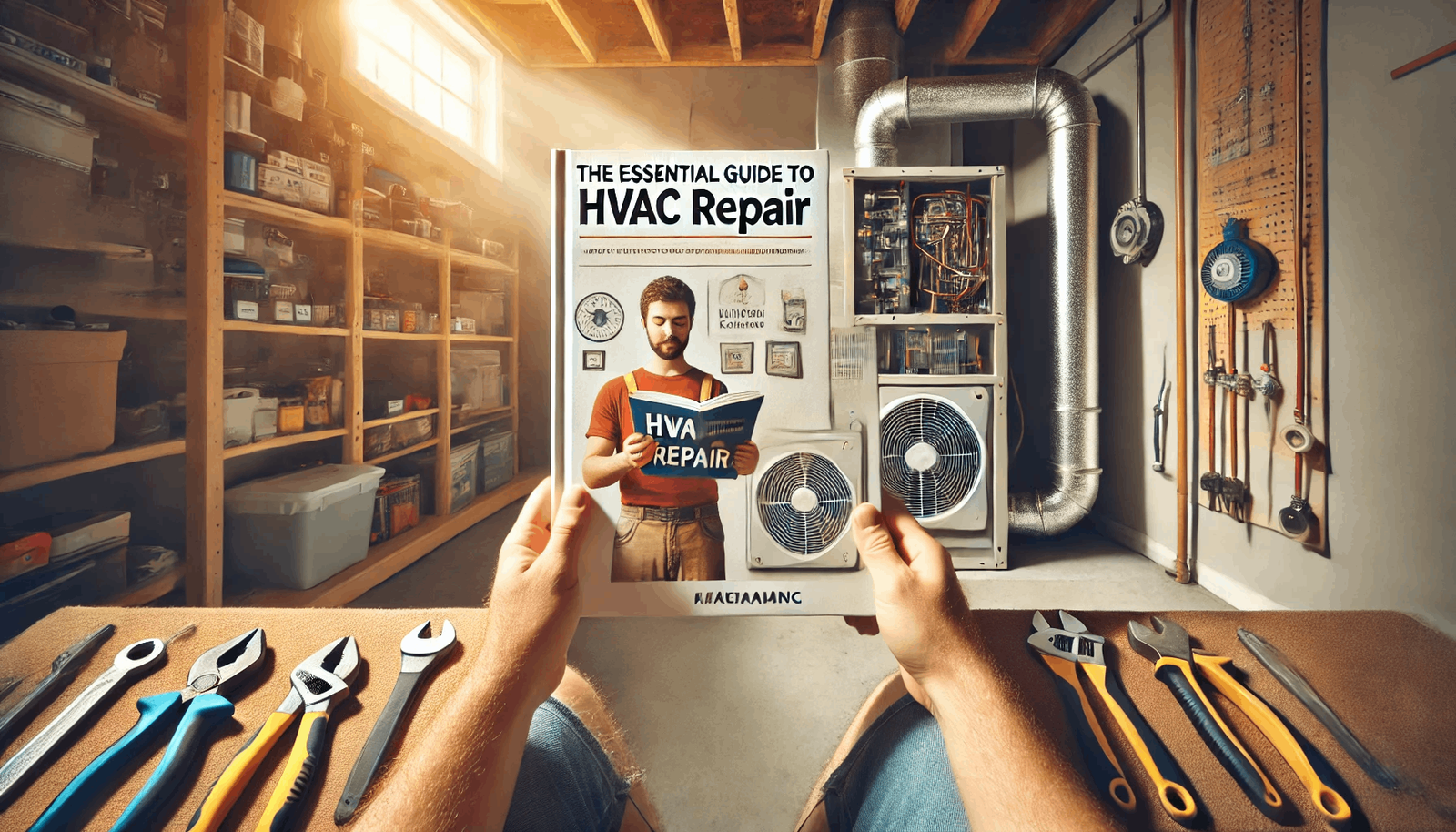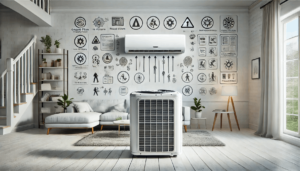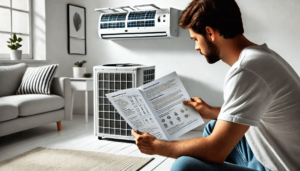Introduction
As a homeowner, understanding your HVAC system is crucial for maintaining a comfortable and energy-efficient living environment. HVAC repair can be daunting, especially when unexpected issues arise. This essential guide will walk you through the fundamentals of HVAC systems, helping you recognize the signs that indicate a need for repair, and outlining common problems you may encounter. Additionally, we’ll provide tips on finding the right HVAC repair service to ensure your system operates smoothly year-round. By arming yourself with this knowledge, you can save time, money, and stress, keeping your home comfortable no matter the season.
Understanding HVAC Systems
What is HVAC?
HVAC stands for Heating, Ventilation, and Air Conditioning. It encompasses the technology used to regulate indoor environmental comfort in residential and commercial buildings. The primary purpose of HVAC systems is to ensure a comfortable atmosphere by controlling temperature, humidity, and air quality. These systems can vary widely in complexity and size, from simple window air conditioning units to intricate, centralized heating and cooling systems. Understanding the fundamentals of HVAC is crucial for homeowners, as it enables them to recognize issues early and seek timely HVAC repair when necessary.
Common Components of HVAC Systems
HVAC systems consist of several key components that work together to create a comfortable indoor environment:
- Furnaces: These are typically used for heating spaces. They can be powered by electricity, natural gas, or oil and work by heating air or water, which is then distributed throughout the home.
- Air Conditioners: These systems are responsible for cooling indoor air. They function by removing heat from the air inside a home and expelling it outside, providing a cooler environment.
- Heat Pumps: These versatile systems can provide both heating and cooling. They transfer heat from one place to another, making them energy-efficient options for temperate climates.
- Ductwork: This network of ducts carries heated or cooled air from the HVAC system to various rooms in your home. Properly sealed and insulated ductwork is vital for maintaining energy efficiency.
- Thermostats: These devices monitor and control the temperature of your home. Programmable and smart thermostats can help optimize energy usage and improve comfort levels.
- Air Filters: Filters are essential for maintaining air quality. They trap dust, pollen, and other airborne particles, ensuring that the air circulating in your home is clean. Regular replacement of filters is crucial for system efficiency and longevity.
- Ventilation Systems: Proper ventilation is essential for maintaining air quality. It involves bringing in fresh air from outside and exhausting stale air from inside, which helps prevent mold growth and other indoor air quality issues.
How HVAC Systems Work Together
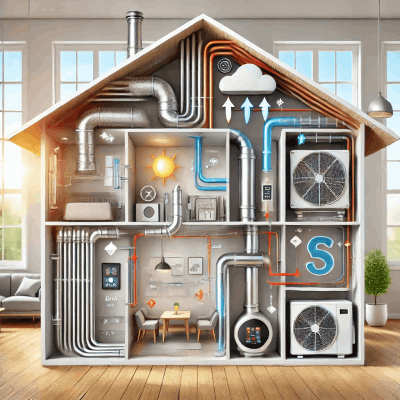
The efficiency of an HVAC system lies in how well its components work together. When you set your thermostat to a desired temperature, the system activates the furnace or air conditioner to either heat or cool the air.
- Heating Mode: In heating mode, the furnace generates heat, which is distributed via ductwork. The thermostat monitors the indoor temperature and communicates with the furnace to ensure it runs until the set temperature is reached. If the air filter is clogged, the system may struggle to operate efficiently, leading to increased energy costs and the potential need for HVAC repair.
- Cooling Mode: In cooling mode, the air conditioner removes heat from the indoor air and transfers it outside. The refrigerant plays a critical role in this process, absorbing heat and cooling the air before it is circulated back into your home. Again, a dirty air filter can restrict airflow, causing the system to overwork and potentially fail.
- Ventilation: Ventilation systems work to balance indoor air quality with energy efficiency. By circulating fresh air into the home and exhausting stale air, these systems help maintain a comfortable and healthy living environment.
Understanding how these components interact can help you identify issues before they escalate into significant HVAC repair needs. Regular maintenance, such as cleaning filters and inspecting ductwork, can enhance the performance and lifespan of your HVAC system.
Signs Your HVAC System Needs Repair
Unusual Noises and Smells
One of the first indicators that your HVAC system may need repair is the presence of unusual noises or smells. Common sounds like banging, clanking, or grinding can suggest that components are loose or damaged. For instance, a rattling noise might indicate loose screws in the furnace, while a grinding sound could mean the motor bearings are worn out. These issues should not be ignored, as they can lead to more severe damage if left unaddressed.
In addition to noises, any strange smells can also signal trouble. A burning smell may indicate overheating components, while a musty odor could suggest mold growth in your ducts or within the unit itself. Any unusual smells or sounds warrant immediate attention to prevent costly HVAC repair down the line.
Inconsistent Temperature Control
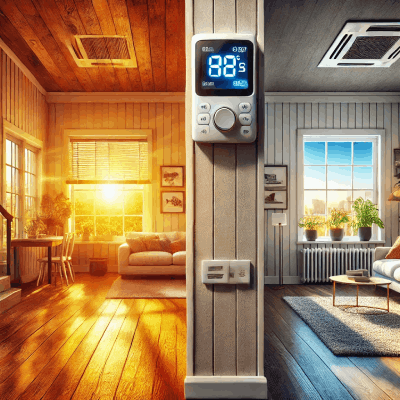
If you find that some rooms in your home are significantly warmer or cooler than others, it’s a sign that your HVAC system may be malfunctioning. Inconsistent temperature control can stem from various issues, including blocked ductwork, insufficient insulation, or problems with the thermostat.
Blocked air ducts can restrict airflow, making it difficult for your system to maintain an even temperature throughout your home. If your thermostat is malfunctioning, it may not accurately read the indoor temperature, leading to inefficient heating or cooling. Homeowners should pay close attention to these discrepancies, as they can lead to increased energy usage and potential system failure.
Increased Energy Bills
A sudden spike in your energy bills can be another warning sign that your HVAC system requires repair. As systems begin to malfunction, they often work harder to maintain the desired temperature, leading to increased energy consumption.
Common culprits for rising energy bills include dirty air filters, which restrict airflow and force your system to work harder, or refrigerant leaks that reduce the efficiency of your air conditioner. If you notice a consistent increase in your energy bills without a corresponding change in usage, it’s essential to investigate further. Regular maintenance, such as changing filters and checking for leaks, can help mitigate these costs and prolong the lifespan of your HVAC system.
Frequent Cycling On and Off
Another red flag to watch for is when your HVAC system cycles on and off more frequently than usual. This issue, known as short cycling, can be caused by a variety of factors, including an oversized system, malfunctioning thermostat, or clogged filters.
When an HVAC system is too large for the space it’s meant to heat or cool, it can quickly reach the desired temperature and shut off, only to turn back on shortly after. This can lead to unnecessary wear and tear on the system, ultimately resulting in the need for HVAC repair.
Additionally, a malfunctioning thermostat can misread temperatures, causing the system to cycle erratically. Clogged air filters can also restrict airflow, leading to overheating and frequent shutdowns. Homeowners should keep an eye on their system’s cycling patterns and consult a professional if they notice excessive short cycling.
By being vigilant about these signs, homeowners can address potential HVAC issues early, preventing more significant repairs and ensuring a comfortable living environment year-round.
Common HVAC Repair Issues
Refrigerant Leaks
One of the most common HVAC repair issues homeowners face is refrigerant leaks. Refrigerant is the fluid that circulates through your air conditioning system, absorbing heat from your home and releasing it outside. When there is a leak, the system cannot function efficiently, leading to reduced cooling capacity and increased energy costs.
Detecting refrigerant leaks can be challenging, but there are some telltale signs to watch for. If your air conditioner is blowing warm air or if you notice ice forming on the evaporator coils, it may indicate a refrigerant issue. Additionally, you might hear a hissing sound, which often accompanies a refrigerant leak. If you suspect a leak, it’s essential to call a professional technician to conduct repairs, as handling refrigerants requires specific expertise and adherence to environmental regulations.
Clogged Air Filters
Clogged air filters are another common problem that can lead to HVAC repair needs. Air filters play a vital role in maintaining indoor air quality and ensuring proper airflow within the HVAC system. When filters become dirty and clogged with dust, pollen, and other debris, they restrict airflow, causing the system to work harder to maintain the desired temperature.
This strain can lead to various issues, including overheating, reduced efficiency, and even complete system failure. Homeowners should regularly check and replace air filters—typically every one to three months—to prevent these issues. Not only does this maintenance step enhance system performance, but it also contributes to better indoor air quality and lower energy bills.
Thermostat Malfunctions

A malfunctioning thermostat can wreak havoc on your HVAC system, leading to discomfort and increased energy costs. The thermostat is the control center of your heating and cooling system, and if it isn’t functioning correctly, it can misread the indoor temperature. This misreading may cause the HVAC system to run longer than necessary or fail to turn on altogether.
Symptoms of a faulty thermostat include inconsistent temperature readings, unresponsive controls, or the system not cycling on and off as it should. Sometimes, the issue may simply be a dead battery or a misconfigured setting, but in other cases, the thermostat may need to be recalibrated or replaced. Regular maintenance checks can help catch these problems early, ensuring your system operates efficiently.
Broken Blowers and Compressors
Blowers and compressors are critical components of your HVAC system, and their failure can lead to significant issues. The blower is responsible for circulating air throughout your home, while the compressor pumps refrigerant through the system. If either component breaks down, you may notice inadequate airflow, unusual noises, or a complete lack of heating or cooling.
Signs of a failing blower include weak airflow, loud noises, or the system running continuously without achieving the desired temperature. On the other hand, if the compressor is malfunctioning, you might hear strange sounds, notice fluid leaks, or see that the outdoor unit is not running at all.
Addressing blower and compressor issues promptly is essential. Neglecting these repairs can lead to further complications, resulting in more extensive HVAC repair needs and increased costs. Regular maintenance, including cleaning and inspecting these components, can help extend their lifespan and improve overall system efficiency.
By being aware of these common HVAC repair issues, homeowners can take proactive steps to maintain their systems and seek timely repairs when necessary. Staying informed not only enhances comfort but also saves money in the long run.
Finding the Right HVAC Repair Service
Questions to Ask Potential Technicians
When searching for the right HVAC repair service, asking the right questions can help you make an informed decision. Start by inquiring about their experience and expertise. Ask how long they have been in the HVAC business and whether they have experience with your specific system type. It’s also helpful to know if they specialize in residential or commercial HVAC systems, as this can impact their approach to repairs.
Another important question is about their diagnostic process. Understanding how they assess HVAC issues can give you confidence in their expertise. Additionally, inquire about their approach to pricing. A reputable technician should provide a clear estimate and explain any potential costs before commencing work. It’s also wise to ask if they offer emergency services, as HVAC issues can arise unexpectedly.
The Importance of Licensing and Certification
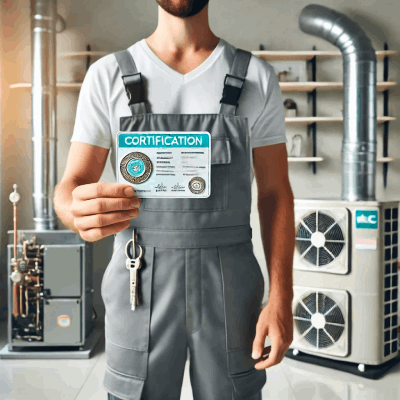
When selecting an HVAC repair service, ensure that the technicians are properly licensed and certified. HVAC professionals are required to meet specific licensing standards that vary by state or region. A valid license indicates that the technician has undergone the necessary training and is knowledgeable about HVAC systems and local codes.
Certifications from recognized organizations, such as the Environmental Protection Agency (EPA) for refrigerant handling or North American Technician Excellence (NATE), can further validate a technician’s skills. These certifications demonstrate a commitment to professionalism and ongoing education in the field. Hiring licensed and certified technicians can provide peace of mind that your HVAC repair is in capable hands.
Reading Reviews and Testimonials
Customer reviews and testimonials can offer valuable insights into the quality of service provided by an HVAC repair company. Online platforms such as Google, Yelp, and Angie’s List allow homeowners to share their experiences, both positive and negative. Look for patterns in reviews—consistent praise or complaints about specific aspects of service can help you gauge the reliability of a company.
Additionally, consider asking for references from the HVAC company. Speaking directly with previous customers can provide a clearer picture of their work quality, professionalism, and overall customer satisfaction. A reputable company should be willing to share this information, demonstrating their confidence in the services they provide.
Understanding Service Contracts and Warranties
Before committing to an HVAC repair service, it’s essential to understand their service contracts and warranties. A well-defined service contract can protect you from unexpected expenses and ensure that you receive consistent maintenance and support. Inquire about what services are included, the duration of the contract, and any fees associated with cancellations or modifications.
Warranties on repairs and parts are also crucial. A reliable HVAC company should stand behind their work by offering a warranty on repairs and installed parts. This not only reflects their confidence in their workmanship but also provides you with added protection against future issues. Be sure to read the fine print to understand what is covered and for how long.
By asking the right questions, ensuring the technicians are properly licensed, reading reviews, and understanding service contracts, you can find a trustworthy HVAC repair service that meets your needs. This due diligence can lead to successful repairs, enhanced system performance, and a more comfortable home.
Conclusion
Navigating the complexities of HVAC repair is an essential skill for homeowners looking to maintain a comfortable living environment. By understanding your HVAC system, recognizing signs that repairs are needed, and identifying common issues, you can take proactive steps to ensure optimal performance. Moreover, knowing how to find a reliable HVAC repair service is crucial for timely and effective solutions.
Regular maintenance and early intervention can save you money and extend the lifespan of your system. Empower yourself with knowledge, ask the right questions, and don’t hesitate to seek professional help when needed. A well-functioning HVAC system not only enhances your comfort but also contributes to a healthier home environment.
By being informed and prepared, you can tackle HVAC challenges with confidence, ensuring your home remains a comfortable haven year-round.
Resources
- U.S. Department of Energy – Heating, Ventilation, and Air Conditioning Systems
- Carrier – What is HVAC?
- Trane – HVAC System Basics
- American Society of Heating, Refrigerating and Air-Conditioning Engineers (ASHRAE) – HVAC Systems and Equipment Handbook
- ENERGY STAR – Guide to Efficient Heating and Cooling
- Lennox – Understanding HVAC Parts and Components
- Family Handyman – Common HVAC Problems and How to Fix Them
- This Old House – HVAC Maintenance Tips
- Bob Vila – HVAC Maintenance Basics
- Angie’s List – 10 Signs Your HVAC Needs Repair
- HVAC.com – How to Tell if Your HVAC System Needs Repair
- American Home Shield – Common HVAC Warning Signs
- Better Business Bureau (BBB) – How to Hire a Heating and Cooling Contractor
- Yelp – Finding HVAC Repair Near Me
- Google Business Profiles – HVAC Service Providers Near Me
- North American Technician Excellence (NATE) – Why NATE Certification Matters
- Environmental Protection Agency (EPA) – HVAC Licensing Requirements for Refrigerants
- HVAC Excellence – Certification for HVAC Technicians
- Angi (formerly Angie’s List) – How to Find Reliable HVAC Contractors
- HomeAdvisor – How to Read Reviews for HVAC Companies
- Consumer Reports – Hiring Reliable HVAC Technicians
- U.S. Department of Energy – What’s Included in HVAC Maintenance Contracts
- Home Warranty of America – Understanding HVAC Warranties
- Sears Home Services – What to Know About HVAC Service Contracts

